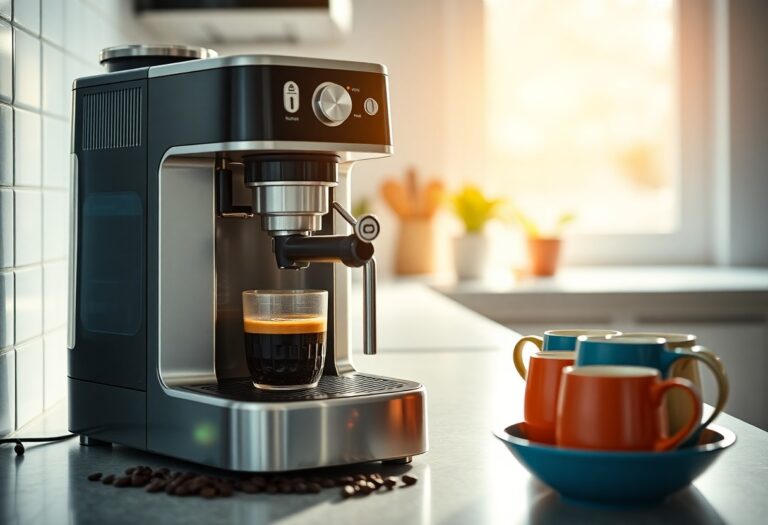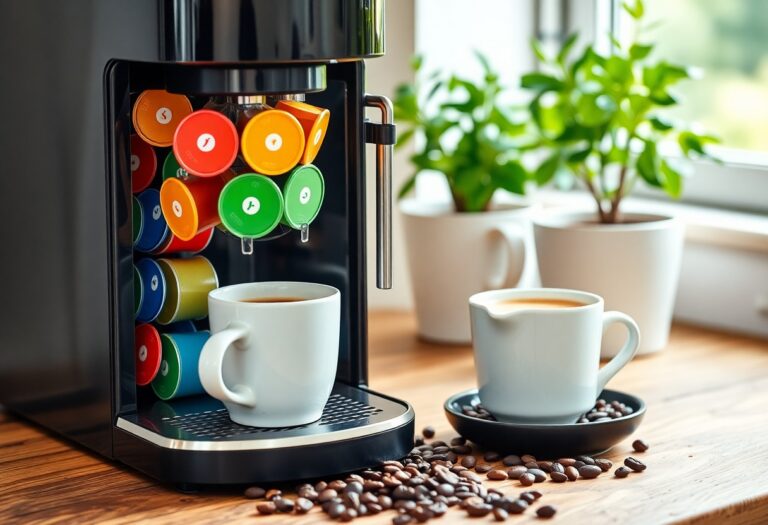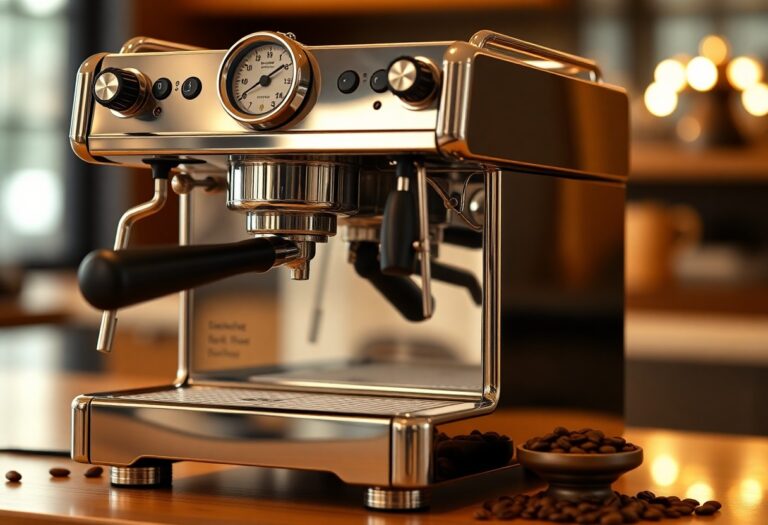What Can I Use to Descale My DeLonghi Coffee Machine – Brand Solutions
Over time, mineral buildup can affect your DeLonghi coffee machine’s performance and taste, so it’s important to descale it regularly. You have several options for descaling, including using commercial descaling solutions, which are specifically formulated for coffee machines, or natural alternatives like vinegar or citric acid. Utilizing these solutions effectively can maintain your machine’s longevity and improve your coffee quality. In this guide, you’ll learn the best practices and solutions to keep your DeLonghi running smoothly.
Key Takeaways:
- Use a descaling solution specifically designed for coffee machines, such as the DeLonghi EcoDecalk, to ensure optimal performance.
- Alternative options include white vinegar or citric acid, but these may not be as effective and can potentially void warranties.
- Always follow the manufacturer’s guidelines regarding the descaling process and frequency to maintain the machine’s longevity.
- Regular descaling is important to prevent mineral buildup that can affect the taste of coffee and machine efficiency.
- Consult the user manual for specific instructions tailored to your DeLonghi model for best results.
The Science of Limescale Buildup: Why Descaling is Essential
Limescale buildup results from the minerals found in water, primarily calcium and magnesium. Over time, as water is heated in your DeLonghi coffee machine, these minerals precipitate out and form deposits that can obstruct vital components, such as the heating element and water pathways. Regular descaling is necessary to prevent this buildup and ensure your machine operates efficiently, prolonging its lifespan, while maintaining your coffee’s flavor quality.
The Chemistry of Water and Coffee Machines
The quality of your water significantly impacts the performance of your coffee machine. Hard water, which contains higher levels of minerals, leads to increased limescale formation. This chemical reaction occurs as heated water evaporates, leaving the minerals behind to coat surfaces within your coffee maker. Using distilled or filtered water can mitigate this issue, reducing the frequency of descaling required.
Impacts of Limescale on Performance and Taste
Limescale not only affects the mechanical performance of your coffee machine but also alters the taste of your coffee. As the mineral deposits accumulate, they can restrict water flow and heating efficiency, which may lead to *under-extraction* or *over-extraction* of coffee grounds. This imbalance can result in a bitter or sour taste, negatively affecting your overall brewing experience.
Moreover, limescale can cause your machine to require more energy to heat water, leading to higher electricity costs. A study revealed that coffee brewed from machines with significant limescale buildup can taste up to 30% different than that from regularly maintained machines. By prioritizing descaling, you not only uphold the machine’s functionality but also enhance your coffee’s flavor, ensuring each cup meets your expectations.
Approved Descaling Agents: Top Choices for DeLonghi Coffee Machines
To keep your DeLonghi coffee machine in optimal condition, use descaling agents that are specifically approved for your model. Using the right products not only extends the life of your machine but also ensures great-tasting coffee every time. Below are some of the top choices recognized for their efficacy in tackling mineral build-up.
The Benefits of Using DeLonghi’s Official Descaler
Choosing DeLonghi’s official descaler offers numerous advantages, including its formulation designed to effectively dissolve limescale without damaging your machine. This eco-friendly solution not only minimizes environmental impact but also guarantees compatibility across various DeLonghi models. Using their descaler ensures you’re following manufacturer recommendations, which can help preserve warranty coverage.
Comparing Vinegar, Citric Acid, and Commercial Descalers
While you might consider natural alternatives like vinegar and citric acid for descaling, these options come with important caveats. Vinegar can leave lingering odors and may not effectively eliminate tough mineral deposits, while citric acid may not be as potent as commercial solutions specifically engineered for coffee machines. The table below compares these options based on effectiveness and safety.
Descaling Agents Comparison
| Agent | Effectiveness & Safety |
|---|---|
| DeLonghi Official Descaler | Highly effective & safe for all models |
| Vinegar | Moderately effective; risk of odor and residue |
| Citric Acid | Effective but may not remove heavy scale |
| Commercial Descalers | Varied effectiveness, often tailored for specific brands |
When choosing between these descaling agents, consider the effectiveness of DeLonghi’s official descaler against natural alternatives. Vinegar may seem convenient, but it lacks the potency needed for long-term maintenance and can leave unpleasant smells. Citric acid has its merits but often falls short against heavy mineral deposits. Commercial descalers may vary, so sticking with the brand-specific option ensures optimal results without compromising your machine’s functionality.
More Information on Comparing Descalers
| Factor | Details |
|---|---|
| Compatibility | DeLonghi descaler is universally compatible with all models |
| Cost | Natural solutions can be cheaper, but may require more frequent use |
| Environmental Impact | DeLonghi’s is eco-friendly; vinegar and citric acid are also biodegradable |
| Long-Term Effects | Using specially formulated descalers can enhance machine lifespan |
Long-term benefits of selecting the right descaler reflect on machine performance. Not only does DeLonghi’s official product ensure efficiency, but its safety profile protects sensitive components within your coffee maker. Meanwhile, while natural options can be intriguing, their potential drawbacks might lead to more significant issues down the line, affecting both taste and machine integrity.
Step-by-Step Guide to Descaling Your DeLonghi Machine
Preparing Your Machine for Descaling
Start by ensuring your DeLonghi coffee machine is powered off and cooled down. Empty the water reservoir and drip tray to prevent any overflow during the descaling process. Make sure to use only recommended descaling solutions to maintain the machine’s performance and warranty. Read the instructions on the descaling solution packaging for safe use and preparations.
Detailed Descaling Process: Step-by-Step Instructions
The descaling process can be broken down into several key steps, ensuring your machine remains in peak condition. Follow this detailed guide to ensure effective descaling:
| Step | Action |
|---|---|
| 1 | Mix the descaling solution with water as directed. |
| 2 | Pour the solution into the water reservoir. |
| 3 | Place a container under the coffee spout to collect the solution. |
| 4 | Turn on the machine and select the descaling program if available. |
| 5 | Run the descaling cycle as instructed by the machine. |
| 6 | Rinse the water reservoir and fill it with fresh water. |
| 7 | Run a rinse cycle to flush out any remaining descaling solution. |
| 8 | Dispose of the collected solution and clean the drip tray. |
Executing the descaling process efficiently will dramatically improve the longevity and taste of your coffee. Each of these steps plays a vital role in cleaning and maintaining your machine. Pay close attention to the amount of water used in mixing the descaler, as using too little or too much can affect how well the minerals are removed. After completing the rinsing process, you may notice a significant improvement in flavor, ensuring that your next cup of coffee is as vibrant and fresh as possible.

Maintenance Tips: Preventing Future Limescale Issues
Employing effective maintenance strategies is key to prolonging your DeLonghi coffee machine’s lifespan and avoiding limescale buildup. Regularly follow these tips to keep your machine in optimal condition:
- Use filtered or bottled water to minimize hard water exposure.
- Run cleansing cycles every month to eliminate coffee oils and residue.
- Keep the water reservoir clean and free from debris.
- Monitor your usage and descale as needed, typically every 2-3 months.
Perceiving these practices as routine maintenance can significantly enhance your coffee experience over time. For more guidance, check out which descaler should I use with my espresso coffee ….
Optimal Water Choices for Your Coffee Machine
Your choice of water affects the taste of your coffee and the longevity of your machine. Utilizing filtered or bottled water can significantly decrease the minerals that contribute to limescale buildup. Hard tap water may lead to frequent descaling, while softer water enables smoother operation and richer flavor extraction.
Regular Maintenance Practices to Extend Lifespan
Incorporating imperative maintenance routines can greatly extend the life of your DeLonghi coffee machine. Scheduling regular deep cleans, inspecting parts for wear, and promptly replacing worn components can help maintain performance. Ensure the machine is free from dust and food particles, and check seals and gaskets for damage. A consistent maintenance schedule allows you to catch potential issues before they escalate into costly repairs or replacements.
Adopting a holistic view of your coffee machine’s requirements aids in preserving its efficiency. Check water quality frequently and don’t overlook necessary component replacements, which can keep your beverages tasting as intended. Additionally, monitoring for signs of wear or other malfunctions can thwart irregularities before they lead to significant damage or a decline in performance. Regular care will not only improve your coffee but also enhance your daily routines.

User Perspectives: Common Mistakes and Misconceptions
Many users overlook the significance of regular descaling, often thinking that occasional cleaning is sufficient. This leads to common pitfalls, such as using non-recommended descaling solutions or not following the machine’s specific instructions. Misunderstandings about the impact of mineral buildup can also predispose coffee lovers to a decline in coffee quality and even machine longevity—both of which are affected by inadequate maintenance.
Debunking Myths Surrounding Descaling Frequency
Some users believe that descaling only needs to be done once or twice a year, assuming that their water quality is high and mineral deposits will be minimal. In reality, factors such as your local water hardness and frequency of use can dramatically alter this timeline. The general recommendation is to descale every two to three months, or as prompted by your machine’s indicator, ensuring optimal performance.
Insights from Experienced Users
Experienced coffee enthusiasts often emphasize the importance of staying proactive in descaling routines. Many report that consistent maintenance prevents not only taste issues but also costly repairs down the line. Users have found that incorporating descaling as part of their regular coffee-making ritual significantly enhances the flavor of their brew and extends their machine’s life.
Further insights reveal that seasoned users recommend investing in a reliable water filter to reduce scale buildup from hard water. They also enjoy leveraging homemade descaling solutions, such as a blend of vinegar and water, as a cost-effective method. Sharing personal anecdotes of improved coffee flavor and machine efficiency after adopting a disciplined descaling schedule, these users advocate for integrating descaling into your coffee care routine to avoid disappointment and ensure a satisfying cup every time.
Summing up
Upon reflecting, you have several effective options to descale your DeLonghi coffee machine. Using a dedicated descaling solution, such as those from DeLonghi, ensures compatibility and optimal results. Alternatively, a mixture of water and white vinegar serves as a natural, economical choice. Regardless of the method you choose, regular descaling will enhance the performance and longevity of your machine, ensuring that each cup of coffee remains as delightful as the last. Embrace these solutions to keep your coffee experience enjoyable and your machine in top shape.
FAQ
Q: What is descaling and why is it important for my DeLonghi coffee machine?
A: Descaling is the process of removing mineral deposits, commonly found in hard water, that accumulate in your coffee machine over time. It is vital to maintain the performance and longevity of your DeLonghi coffee machine. By descaling regularly, you can prevent blockages, ensure optimal water flow, and enhance the quality of the coffee you brew.
Q: What solutions are recommended for descaling my DeLonghi coffee machine?
A: DeLonghi recommends using their proprietary descaling solution, which is specifically formulated for their machines. Alternatively, you can use a mixture of white vinegar and water, although this may not be as effective. Always ensure that any descaling solution you choose is suitable for coffee machines to avoid damaging internal components.
Q: How often should I descale my DeLonghi coffee machine?
A: The frequency of descaling depends on how often you use the machine and the hardness of your water. For general guidance, it is advised to descale your DeLonghi coffee machine every 2-3 months. However, if you notice a decrease in coffee quality or an alert from the machine indicating descaling is needed, you should do it sooner.
Q: Can I use third-party descaling products on my DeLonghi coffee machine?
A: While some third-party descaling products may be effective, it’s recommended to use descalers that are specifically designed for coffee machines. Using unapproved products can potentially harm your coffee machine and void the warranty. Always check the manufacturer’s guidelines before using any third-party solution.
Q: What is the proper descaling process for my DeLonghi coffee machine?
A: To descale your DeLonghi coffee machine, start by emptying the water reservoir and filling it with the descaling solution as per the manufacturer’s instructions. Run the descaling program as outlined in your machine’s manual. After the process is complete, make sure to rinse the water reservoir and run a few cycles of clean water to ensure all remnants of the descaling solution are removed before brewing coffee again.







